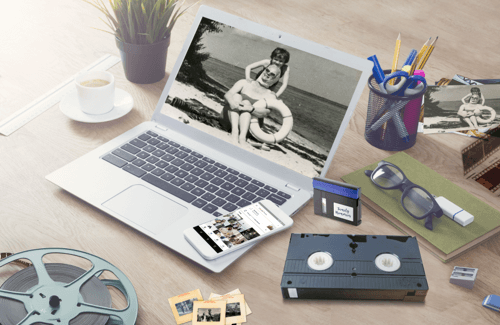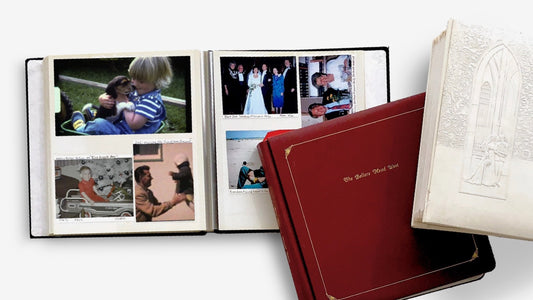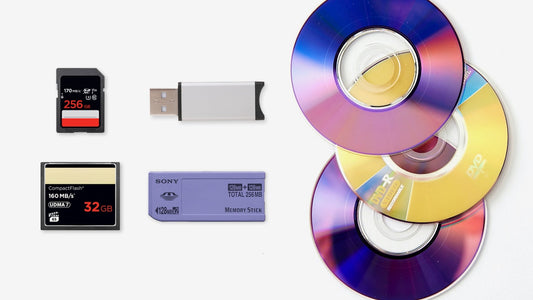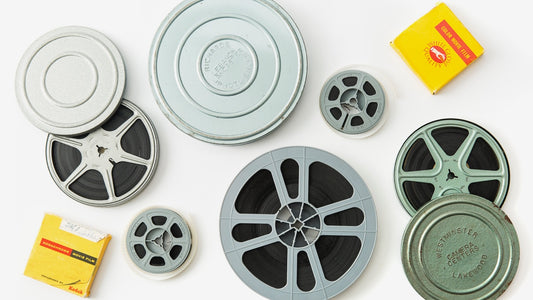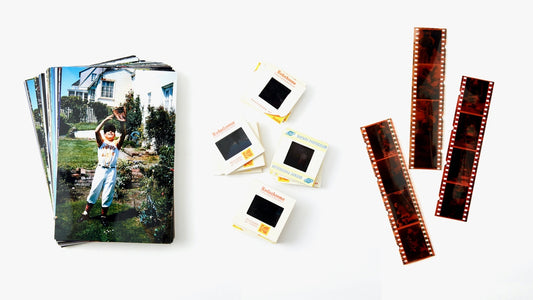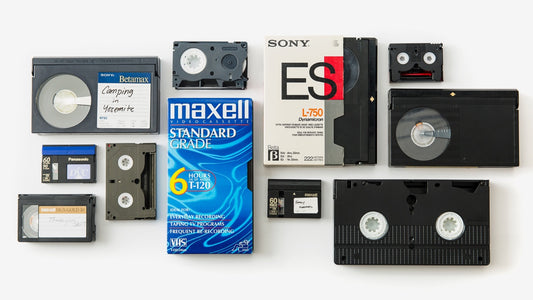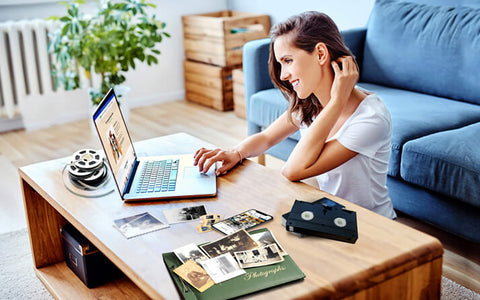Your favorite mixtapes, candid home recordings, and the albums that shaped your youth are all on fragile cassette tapes. With each passing year, those precious sounds are at risk of fading away. But you can protect them. The best way is to convert cassette to digital, creating durable files you can enjoy forever. This guide will show you exactly how. We’ll walk through choosing the right converter and using simple software to bring your recordings into the digital age. You'll get all the tips you need to finally preserve your most important audio.
Key Takeaways
- Preserve your audio memories by converting fragile cassette tapes to digital files. This protects your recordings from damage and makes them accessible on modern devices.
- Choose the conversion method that best fits your needs. Options range from DIY methods using USB converters or cassette decks to professional services like YesVideo, offering varying levels of convenience and quality.
- Careful preparation and organization ensure a smooth conversion process. Clean your tapes and equipment, optimize audio settings, and back up your digital files in multiple locations for safekeeping.
What Does It Mean to Cassette-to-Digital Conversion?
Cassette-to-digital conversion is simply transferring the audio from your old cassette tapes into digital files. Think of it like moving your music collection from a physical shelf to your computer or phone. This process transforms those analog sounds into modern digital formats like MP3s or WAVs, making them playable on practically any device. You can listen on your computer, phone, tablet, or even transfer the files to a modern digital audio player.
This conversion isn't just about updating your listening habits; it's about preserving your audio memories. Cassette tapes degrade over time, and finding a working cassette player is becoming increasingly difficult. Digitizing your cassettes safeguards those precious recordings—music, spoken word, family memories—and keeps them accessible for years to come. YesVideo specializes in this type of conversion, ensuring your audio is preserved in the highest quality.
Why Should You Digitize Your Cassette Tapes?
Let's be honest, cassette tapes are fragile. Over time, they can degrade, losing precious audio quality and becoming unplayable. Digitizing your cassettes is like giving them a new lease on life, ensuring your memories are safe and sound for years to come. Plus, it's way more convenient to listen to your favorite mixtapes on your phone or computer than digging out your old boombox. There are several key reasons why you should consider converting your cassette collection to digital:
Keep Your Audio Memories from Fading
Think about all those home recordings, favorite albums, and mixtapes you've cherished over the years. Cassette tapes are susceptible to wear and tear, not to mention the dreaded "tape hiss" that gets worse over time. Digitizing your cassettes creates a permanent backup of your audio, protecting it from physical damage and deterioration. This way, you're not just preserving the music, you're preserving the memories associated with them. Imagine being able to easily share those memories with future generations.
Listen to Your Tapes Anywhere, Anytime
Remember how cumbersome it was to share cassette tapes? You had to physically hand them over, hoping they'd be returned in good condition. With digital files, sharing is easy. You can quickly transfer your music to a computer, phone, or cloud storage, making it accessible anytime, anywhere. No more searching for a working cassette player – your entire audio library is at your fingertips. Plus, you can create multiple backups, ensuring your precious recordings are never truly lost.
Restore and Improve Sound Quality
While some may argue for the nostalgic charm of cassette tapes, the sound quality isn't always ideal. Professional conversion services, like those offered by YesVideo, often include digital remastering techniques that can enhance the sound quality of your old recordings. This means you might hear nuances and details in your favorite songs that you never noticed before. It's like hearing them for the first time again, but with clearer, richer sound.
How to Convert Cassettes to Digital: 3 Main Ways
Want to rediscover those old mixtapes or family recordings? Digitizing your cassettes is easier than you think. Here's a breakdown of how to convert cassettes to digital files, from simple DIY methods to professional services.
The Easy Way: USB Cassette Converters
These handy little devices offer a plug-and-play solution for converting your cassettes. A USB cassette converter, like the popular HopCentury model, connects directly to your computer via USB. Most come with software that guides you through recording and saving your audio as digital files (usually MP3s or WAVs). Some converters even have a built-in speaker and headphone jack so you can listen to your tapes directly. This method is perfect for beginners because it requires minimal technical know-how.
Understanding the Time Commitment: Real-Time Recording
Before you start, it’s important to know that converting cassettes isn’t a quick copy-and-paste job. The process happens in real-time, meaning the transfer takes exactly as long as the tape’s runtime. A 90-minute mixtape will take 90 minutes just to record onto your computer—and that doesn't include the time for setup, cleaning the tape heads, or editing the files afterward. If you have a large collection, the hours can add up quickly. For those who find the DIY route too time-consuming, professional digitizing services are a great alternative that can handle the entire process for you.
For Better Quality: Using a Cassette Deck
If you have a cassette deck and a computer with a sound card, you can create digital files yourself. You'll need connecting cables (usually RCA cables) to hook up your cassette deck to your computer's line-in port. You'll also need recording software. Audacity is a free, open-source option, or you could use a paid program like Adobe Audition. This method gives you more control over the recording process, but it does require some technical setup and familiarity with the software. Legacybox offers a helpful guide on transferring cassette tapes to a computer, covering options from cheapest to most expensive.
Professional Conversion Services
For a hassle-free experience, consider using a professional service like YesVideo. We specialize in converting various media formats, including cassettes, to digital files. We handle everything for you, from carefully handling your tapes to creating high-quality digital copies. Professional services ensure your precious audio memories are preserved with the best possible sound quality and minimal effort on your part. Southtree is another reputable option for cassette digitization, delivering your converted files on CDs, thumb drives, or as digital downloads. They emphasize a hands-on approach to ensure high-quality, uncompressed audio.
The Benefits of Trust and Experience
When you’re dealing with irreplaceable memories, handing them over to someone else can feel nerve-wracking. That’s why trust and experience are so important. Choosing a professional service means you’re placing your precious audio in the hands of experts who have spent years perfecting the digitization process. Companies like YesVideo use high-end equipment and have trained technicians who know how to handle delicate, aging tapes with the utmost care. They can often achieve better sound quality than you could at home, cleaning up background noise and restoring the audio to its former glory. It’s the peace of mind that comes from knowing your memories are being preserved safely and professionally.
How the Professional Process Works
If you're picturing a complicated, technical process, you can relax. Professional conversion services have made it incredibly simple. Typically, you start by placing an order online. The company then sends you a crush-proof box with a pre-paid shipping label and instructions. All you have to do is pack up your cassettes and send them in. Once they arrive, technicians carefully digitize each tape by hand, ensuring every moment is captured. After the conversion is complete, they send your original cassettes back to you, along with your new digital files on a thumb drive, in the cloud, or on DVDs. It’s a secure, straightforward way to transfer your media without any of the hassle.
My Top Picks for Cassette-to-Digital Converters
Picking the right cassette-to-digital converter depends on your budget, technical skills, and how much you value sound quality. Let's look at some popular options, from simple USB converters to more advanced setups. For a hassle-free experience and top-notch quality, consider YesVideo's professional digitization services.
Best for Simplicity: Ion Audio
ION Audio offers several cassette converters, notably the ION Tape Express Plus. It's compact and generally gets good reviews for its straightforward USB connection and decent audio output. However, it's a bit pricier than other basic models, so consider if the extra features are worth the investment.
A Classic Choice: Sony
Sony, a trusted name in audio, offers the TCM-150 Cassette Player and Recorder. This model is more versatile than a simple converter, allowing you to both play and record cassettes. While it boasts a long recording time, user reviews on sound quality are mixed. If you're looking for a multi-functional device and prioritize recording capabilities, this might be a good fit.
Great Value: Jensen
Jensen also manufactures audio equipment, including some cassette players with recording functionality. While these might not be marketed specifically as "converters," they can be paired with a computer and software to digitize your tapes. Check out their current product line to see if any models suit your needs. This approach requires a bit more technical know-how but can offer more control over the digitization process.
Other Brands to Consider
Beyond these brands, several other converters cater to different needs and budgets. The Reshow Walkman Cassette Tape Player is a popular portable option that comes with everything you need to get started. It's budget-friendly, but keep in mind that sound quality might not be as high as with more expensive models. For an even more affordable option, the DIGITNOW! USB Audio Capture Card Grabber is a basic plug-and-play device. While it's compatible with most operating systems, user reviews suggest the sound quality can be inconsistent. Finally, the Pyle 2-in-1 Cassette-to-MP3 Converter offers portability and direct MP3 recording, but some users have noted concerns about its build quality and sound output.
What to Look for in a Cassette Converter
Picking the right cassette-to-digital converter depends on several factors. Let's break down what to consider when making your decision.
Checking for Sound Quality and Key Features
When it comes to preserving your audio memories, sound quality matters. Look for features like Dolby noise reduction to minimize hiss and hum. A higher MP3 bitrate also makes a difference. Aim for at least 128kbps, but 320kbps is ideal for richer, clearer audio. Top Ten Reviews offers a helpful guide on what to look for when choosing a converter. Remember, though, a converter can only do so much. If your original cassette tapes are damaged or the recording quality is poor, the digitized version will reflect that.
User Reviews and Potential Sound Issues
A quick look at user reviews for DIY converters shows that experiences can be a mixed bag. While many find these devices simple to set up, especially for recording speech, a common complaint centers on sound quality. You'll often see feedback about the final audio sounding "tinny" or having a noticeable background hiss. The quality of the converter itself is a major factor here; a cheaper model might not capture the full depth of your original recording. Before you buy, it’s smart to read through customer reviews for the specific model you're considering to get a realistic idea of what to expect.
Is It Easy to Use and Compatible?
Nobody wants to wrestle with complicated tech. Choose a converter that's easy to use, ideally with plug-and-play functionality or one-touch recording. Check its compatibility with your computer's operating system and software to avoid headaches. Top Ten Reviews can offer guidance on user-friendly options. A seamless conversion process will make the entire experience more enjoyable.
Potential for Computer Compatibility Problems
It would be nice if you could just plug a simple cable from your cassette player's headphone jack into your computer's USB port, but it's not quite that straightforward. Your tape player produces an analog sound signal, while your computer understands digital information. To bridge this gap, you need a special device called an Analog-to-Digital Converter (ADC). This piece of hardware acts as a translator, turning the smooth waves of analog audio into a digital format your computer can process and save. The quality of the ADC is crucial; a lower-end converter might not capture the full richness of your original recording, which can be disappointing when you’re trying to preserve precious memories.
Considering Your Technical Skill Level
Be honest with yourself about how much you enjoy tinkering with technology. If you're comfortable setting up equipment and learning new programs, the DIY route using a cassette deck connected to your computer’s line-in port can be a rewarding project. You’ll need the right cables and free recording software like Audacity to manage the transfer. This approach gives you the most control over the final result. However, if navigating software settings and figuring out cable connections sounds like a chore, it’s good to know that even some all-in-one USB converters can be tricky. For a completely hands-off experience that guarantees high-quality results, using a professional digitization service is your best bet.
Considering Portability and Design
If you're on the go or have limited space, consider a compact and lightweight converter. Many modern converters are designed for portability, so you can digitize your tapes anywhere. Think about where you'll be using the device most often and choose a design that fits your lifestyle.
Power Options and Important Warnings
When you're choosing a converter, think about how you'll power it. Many devices offer great flexibility, running on either an AC adapter for home use or AA batteries for portability. Some can even draw power directly from your computer through a USB connection, which simplifies your setup. But before you hit record, there are a few important things to keep in mind. The quality of your digital file is completely dependent on the condition of your original tape. If a cassette is damaged or was poorly recorded, the digital version will inherit those flaws. For the best possible outcome, make sure your tapes and player heads are clean. Using high-quality equipment and setting the right volume levels are also critical steps. If you're concerned about getting it right, a professional service can manage these variables to ensure the best transfer.
Finding the Right Balance of Price and Value
Cassette-to-digital converters range in price from budget-friendly to high-end. Legacybox breaks down the costs associated with DIY conversion, which can run between $100 and $500 when factoring in equipment, software, and your time. You can find basic converters for around $25 to $35, while more advanced models can cost over $100. Consider your budget and what features are most important to you. Sometimes, investing a bit more upfront can save you time and frustration. Top Ten Reviews offers insights on finding the best value.
Example Costs for DIY Converters
When you're looking at a DIY approach, the price tag on the converter itself is just the starting point. You can find basic USB cassette converters for as little as $25, which seems like a great deal. More advanced models with better features might set you back over $100. But don't forget to factor in the other costs. You'll need software, and while some options are free, they often come with a learning curve. The biggest hidden cost is your time—the hours you'll spend setting up, recording each tape in real-time, and editing the files. When you add it all up, the total investment for a DIY project can easily range from $100 to $500. It's important to weigh this against the convenience and quality of a professional service.
The Best Software for Editing Your Digital Audio
After converting your cassettes to digital files, you might want to clean up the audio. Hiss, pops, and clicks are common with older tapes. Thankfully, several software options can help enhance your
Great Free Editing Software
If you're on a budget, Audacity is a fantastic option. It's a free, open-source audio editing software packed with features suitable for both beginners and experienced users. With Audacity, you can easily cut, copy, splice, and mix audio tracks, making it perfect for refining your cassette recordings after converting them. You can also reduce background noise and adjust the overall sound levels.
Alternative Software Options for Recording and Testing
While Audacity is a powerhouse for editing, it's not the only tool for your DIY conversion project. Here’s a handy trick: use the free VLC media player to test your setup. Before you commit to a full recording session, you can use VLC to quickly check if your computer is receiving audio from your USB converter or cassette deck. It’s a simple way to confirm everything is connected correctly without launching a full recording program. VLC can also record audio, making it a lightweight alternative if you just need a basic, no-frills recording without extensive editing features. This is especially useful when you're just starting the process of connecting your cassette deck to your computer's line-in port and want to ensure a clean signal.
When to Consider Professional Software
For those willing to invest in more advanced tools, programs like Adobe Audition and Logic Pro X offer professional-grade audio editing capabilities. These programs provide a comprehensive suite of features, including sophisticated noise reduction, audio restoration tools, and multi-track editing. While there's a cost associated with these programs, the investment can be worthwhile if you're aiming for top-notch audio quality. Adobe Audition is a popular choice for its versatility and integration with other Adobe Creative Cloud applications. Logic Pro X is favored by many musicians and podcasters for its powerful recording and mixing capabilities. If you’re looking for high-quality results and have the budget, exploring these professional options can significantly enhance your converted audio.
Comparing Professional Cassette Conversion Services
If DIY isn’t your thing, several companies specialize in digitizing cassette tapes. This is a great option if you have a large collection, limited technical skills, or simply value convenience. Sending your tapes to the pros ensures your audio memories are handled with care and expertise. Prices vary, so it’s worth comparing a few options.
YesVideo
YesVideo offers a comprehensive service for converting various media formats, including cassette tapes. They handle the entire digitization process, focusing on high-quality transfers. Simply send in your tapes and let them do the work.
Our Commitment to Quality and Trust
When you’re dealing with irreplaceable memories, trust is everything. For a completely hassle-free experience, a professional service like YesVideo is your best bet. We specialize in converting all kinds of media, including cassette tapes, into high-quality digital files. With over 20 years of experience, we’ve become the world’s largest and most trusted transfer service because we handle every single order with the care it deserves. Our team of experts processes all your precious media by hand, right here in the USA. We treat your memories as if they were our own, ensuring a high-quality digital transfer that preserves the integrity of your original recordings.
The YesVideo Process and Turnaround Time
We designed our process to be as simple as possible. YesVideo offers a comprehensive service where we handle the entire digitization process, focusing on creating the best possible transfers. All you have to do is send us your tapes, and we take care of the rest. We’ll keep you updated every step of the way, from the moment your order arrives at our facility to when your new digital files are ready. While we specialize in audio cassettes, we can also digitize your old film reels, videotapes, photos, and slide carousels, helping you consolidate your entire family archive into one safe, accessible place.
Longevity of Your New Digital Memories
Digitizing your audio helps keep your memories safe and easy to listen to for a very long time. Unlike physical tapes that degrade with each play, digital files don't wear out. They can be copied and backed up without any loss in quality, giving you peace of mind that your family’s history is secure. Imagine being able to instantly share a mixtape from your college days or a recording of your child’s first words with family across the country. By converting your tapes, you’re not just preserving audio; you’re creating a lasting legacy that future generations can enjoy and cherish, just as you have.
How Southtree Compares
Southtree specializes in converting cassette tapes to digital downloads, CDs, or thumb drives. They offer a straightforward service and often run discounts on tape transfers.
Southtree Pricing and Experience
Southtree keeps things simple with their pricing, offering a digitization service that costs $15 per cassette. The whole process is designed to be easy on your end. They send you a box with a pre-paid shipping label, so all you have to do is pack up your tapes and send them off. With over 10 years of experience, their team digitizes every tape by hand in the USA, and they promise to handle your memories as if they were their own. When they’re done, you get your original cassettes back, plus your new digital copies on a thumb drive, CD, or as a digital download.
What About Legacybox?
Legacybox provides a convenient solution for digitizing cassette tapes, handling the entire process for you. They offer various pricing tiers, making it an accessible option for various budgets.
Using the Costco Photo Center Service
Costco Photo Center offers media conversion services, including cassette tapes. While specific pricing and details may vary, they are known for providing quality photo and media services. This could be a convenient option for existing Costco members.
Walmart Photo's Conversion Option
Walmart Photo also provides a service for converting cassette tapes to digital formats. They offer competitive pricing and a straightforward process, making it a readily available option for many.
Does CVS Photo Convert Cassettes?
CVS Photo offers a service for converting cassette tapes to digital formats. They provide a convenient way to send in your tapes for professional conversion. Check with your local CVS for availability and pricing.
Understanding Service Limitations and Policies
When you hand over your precious memories to a professional service, it’s natural to have questions about the process. Understanding a company's policies upfront can give you peace of mind and set clear expectations. Reputable services are transparent about how they handle your media, what happens if a tape is blank, and the level of quality you can expect. Knowing these details helps you choose the right service and ensures there are no surprises when you receive your newly digitized audio files. It's all about making sure your irreplaceable recordings are treated with the respect they deserve.
How Services Handle Audio Tracks and Blank Tapes
One common concern is what happens if you accidentally send in a blank tape. Most professional services have a policy for this. For instance, some companies will let you know and allow you to send a replacement item without an extra charge. Beyond blank tapes, the primary goal of a professional service is to deliver high-quality transfers. Companies like YesVideo handle the entire digitization process, focusing on preserving your audio with the best possible sound quality. They treat your tapes with great care, ensuring your memories are protected from start to finish. This commitment to quality means you can trust that your audio will be in good hands.
Common Mistakes to Avoid When Converting Cassettes
Converting your old cassette tapes to digital files might seem simple, but there are a few common hiccups that can slow you down. Knowing what to watch out for can save you time and frustration, and help you get the best possible audio quality.
Mistake #1: Using Incompatible Equipment
One of the biggest mistakes is using the wrong equipment. You'll need more than a simple 3.5mm to USB cable. These cables often lack a crucial component: an analog-to-digital converter (ADC). You actually need a USB audio adapter with a built-in ADC. This device converts the analog audio from your cassette player into a digital format your computer can use.
Mistake #2: Ignoring Software Requirements
The right hardware is only half the battle. You'll also need the right software to record the audio. Audacity (for Windows) and QuickTime (for Mac) are good free options. These programs capture the audio from the converter and often have basic editing features to clean up the recordings.
Mistake #3: Settling for Poor Sound Quality
Even with the right equipment and software, sound quality issues can still pop up. Hiss, static, and loss of fidelity are common complaints. Getting a clean transfer often depends on your technical skills and comfort with audio editing software. It's rarely a simple plug-and-play experience. If you're not comfortable troubleshooting these issues, consider a professional service like YesVideo which specializes in audio and video conversions.
Mistake #4: Underestimating the Time It Takes
Finally, remember DIY conversion takes time. Digitizing even one cassette tape can take up to an hour. If you have a large collection, the time commitment can be significant. Factor this in before you start, or explore faster options like professional conversion services.
My Top Tips for a Flawless Conversion
Want to make sure your cassette-to-digital conversion goes smoothly? These tips will help you prepare, optimize your process, and safeguard your newly digitized audio.
First, Get Your Cassettes Ready
Before you even start the conversion process, take a moment to prepare your cassettes. Fast forward and rewind each tape fully to tighten any loose tape and improve playback quality. This also helps to identify any sticky sections that might cause problems during the transfer. Clean the cassette heads on your player with a cleaning kit or some isopropyl alcohol and a cotton swab. Dust and debris can impact sound quality, so a clean player is essential for the best possible transfer.
Recommended Accessories and Costs
If you're going the DIY route, your total investment will depend on the quality you're aiming for and the equipment you already have. You can expect to spend anywhere from $100 to $500 when you factor in hardware, software, and your own time. A simple USB cassette converter is the most budget-friendly option, typically costing between $25 and $35. For those who already own a cassette deck, you’ll just need some RCA cables and free software like Audacity to get started. While the upfront cost of DIY can seem low, it’s important to remember the time commitment and potential for troubleshooting. For a completely hands-off experience that guarantees high-quality results, a professional digitization service like YesVideo handles all the technical work for you, ensuring your memories are preserved perfectly without the hassle.
How to Get the Best Possible Audio Quality
Getting a clean digital recording involves choosing the right hardware and software. You'll need a USB audio adapter with a built-in analog-to-digital converter (ADC). This device takes the analog sound from your cassette player and turns it into a digital format your computer can work with. For software, Audacity is a free, open-source option that's perfect for recording and editing audio. If you're looking for something more advanced, paid software like Adobe Audition offers more features. Experiment with the recording levels in your software to find the sweet spot—loud enough to capture the details, but not so loud that the audio distorts.
Test Your DIY Setup Before Recording
Before you dive headfirst into digitizing your entire cassette collection, a quick test run is a must. This simple step ensures all your gear is talking to each other correctly and can save you the headache of having to re-record everything later. Think of it as a dress rehearsal for your audio preservation project. Taking a few minutes to confirm your setup is working properly will give you the confidence to tackle your tapes and achieve the best possible results without any surprise technical glitches along the way. It’s a small investment of time that pays off in a much smoother process.
How to Check if Your Converter is Working
Start by connecting your cassette player to your analog-to-digital converter (ADC), and then plug the converter into your computer's USB port. It's crucial to use a proper USB audio adapter with a built-in ADC, not just a simple headphone-to-USB cable, to correctly translate the analog sound. Once everything is hooked up, open your chosen recording software, like Audacity. Play a test tape—one you know is in good shape—and watch the audio levels in the software. If you see the levels bouncing, you're good to go! If not, double-check your connections. Before you hit record on your precious memories, adjust the input levels to find a sweet spot that captures clear audio without any distortion or clipping. If this sounds too technical, remember that professional digital media transfer services can handle all the details for you.
Organize and Store Your New Digital Files
Once your audio is digitized, create a clear and organized system for storing your files. Consider creating folders based on artist, album, or date of recording. Use consistent naming conventions for your files to make them easy to search. Storing your files in multiple locations is also a smart move. An external hard drive is a great option for a physical backup, while cloud storage services like Google Drive or Dropbox offer offsite protection and easy access from anywhere.
Don't Forget to Back Up Your Audio!
Don’t risk losing your precious audio memories. After you’ve organized your files, back them up immediately. Consider the time commitment and potential cost of DIY methods. If you’re short on time or prefer a hassle-free experience, a professional service like YesVideo offers a streamlined solution for digitizing your cassette tapes, ensuring your memories are preserved safely and efficiently. Remember, having multiple backups is the best way to protect your irreplaceable audio.
Related Articles
- Cassette to Digital: Your Ultimate Conversion Guide – YesVideo
- Best VHS Video to Digital Converters: Top Picks – YesVideo
- Convert VHS to Digital: The Ultimate 2024 Guide – YesVideo
- Memories Made Digital | Tips & Stories from the YesVideo Blog
- Negative Photos 101: A Comprehensive Guide – YesVideo
Frequently Asked Questions
Why shouldn't I just keep my cassettes as they are?
While there's a certain charm to holding a physical cassette, the tapes themselves are fragile. They degrade over time, losing sound quality and becoming unplayable. Using digital transfer media to digitize your cassettes creates a permanent backup, protecting your audio from physical damage and making it easier to enjoy.
What's the best way to digitize my cassettes if I'm not tech-savvy?
If you're not comfortable with technical setups, using a professional service like YesVideo is your best bet. They handle the entire process, ensuring high-quality transfers without any effort on your part. It's a hassle-free way to preserve your audio memories.
Is it expensive to digitize cassettes myself?
The cost of DIY conversion can vary. While a basic USB cassette converter might seem inexpensive, you'll also need to factor in the cost of software (if it's not included) and the value of your time. If you have a large collection, the time investment can be significant.
What if my cassette tapes are already damaged?
If your tapes are damaged, a professional service might still be able to recover some of the audio. They have specialized equipment and expertise in handling delicate media. While digitizing won't magically fix severe damage, it can often salvage what's left and prevent further deterioration.
How can I ensure the best possible sound quality when digitizing?
Whether you're doing it yourself or using a service, cleaning your tapes and the playback equipment beforehand is crucial. If you're using a DIY method, experiment with the recording levels in your software to find the sweet spot that minimizes noise and maximizes clarity. Professional services often use techniques to enhance the audio quality during the transfer process.




